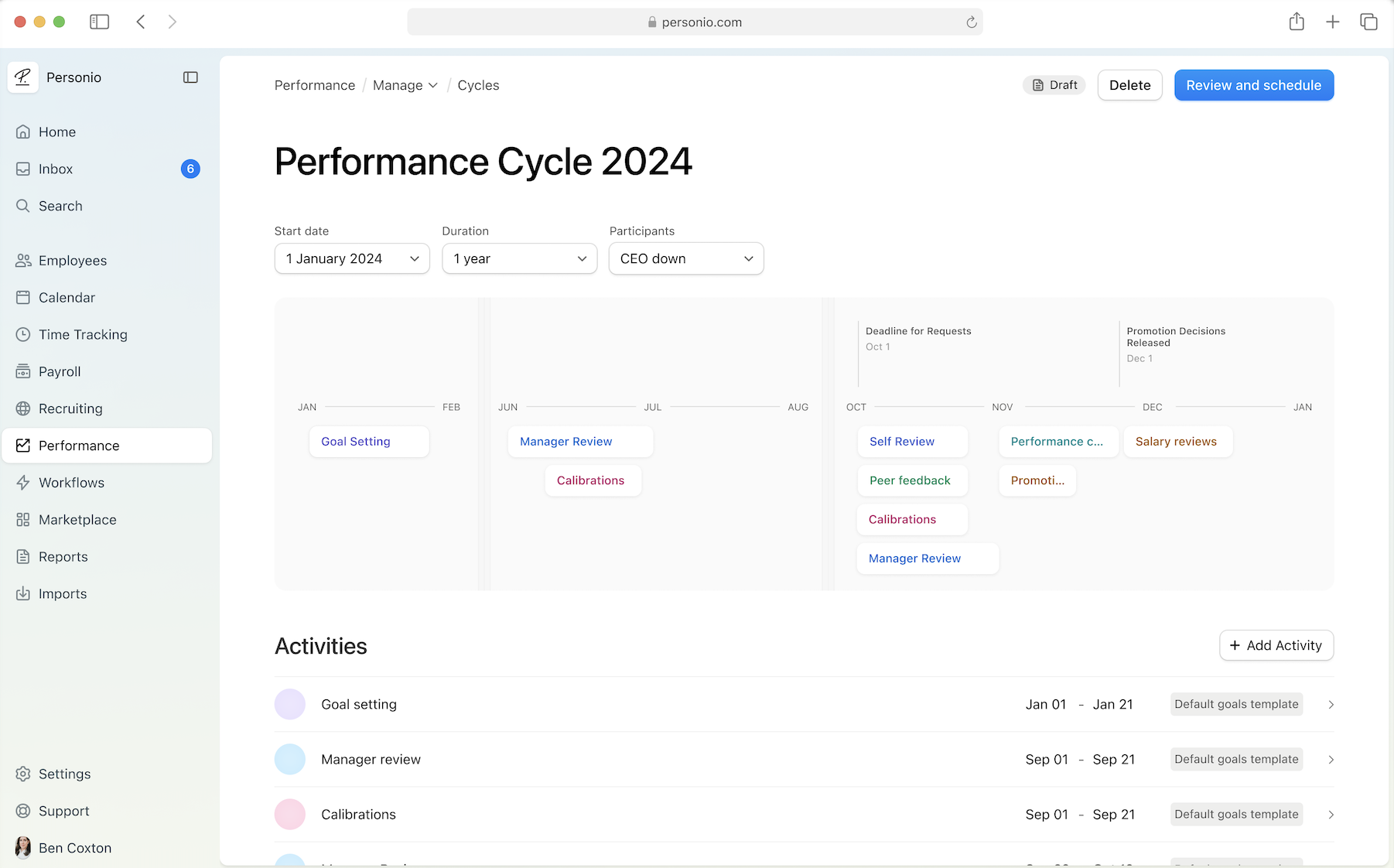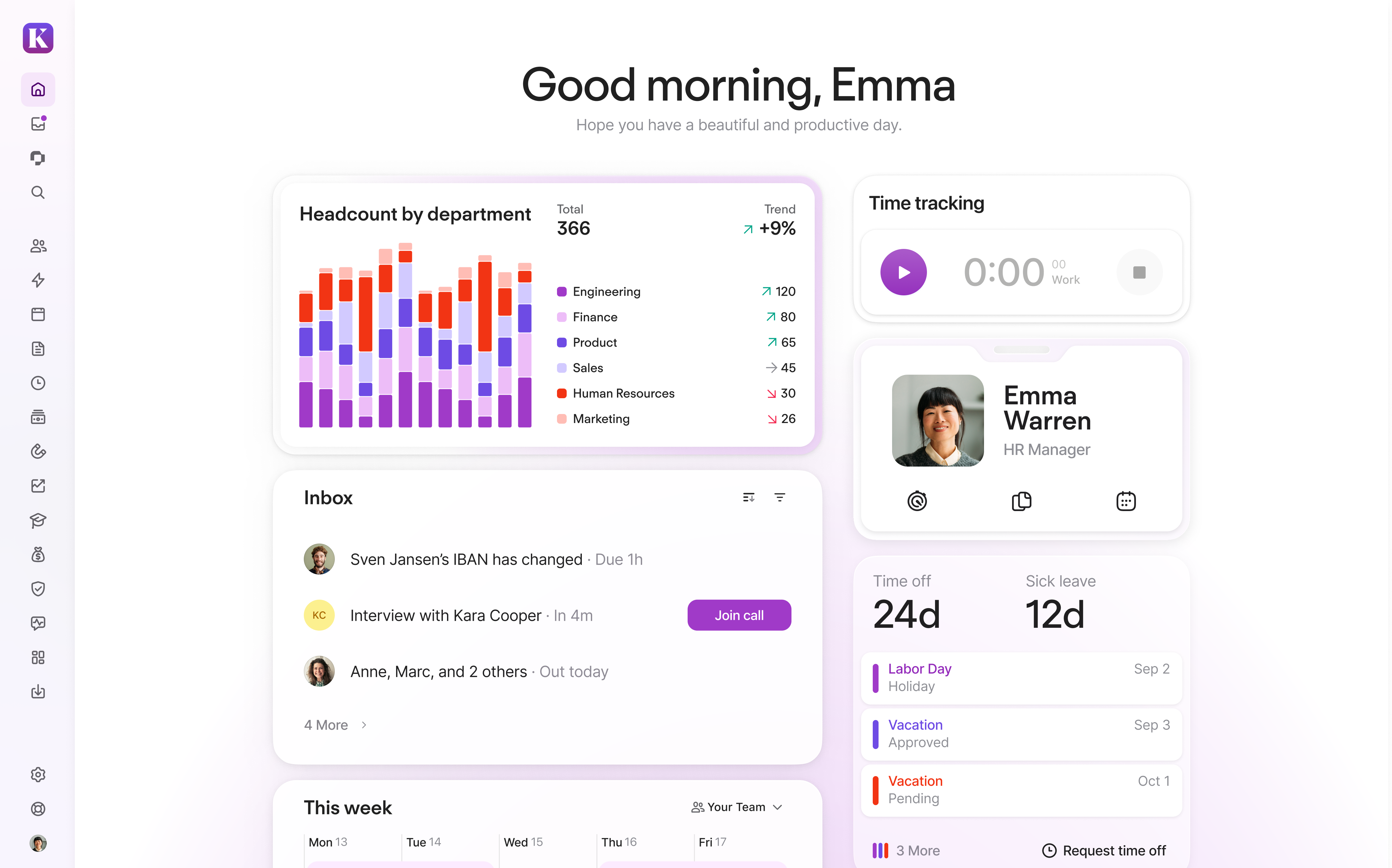
Centralise HR processes in a single platform
Create HR workflows and build better review cycles with Personio's intuitive performance management software
Find out moreSelf Appraisals: How To Help Employees Self Reflect

By pairing a manager’s performance review with an employee’s self appraisal, companies can empower their employees to reflect, assess, and set their own goals. The only problem is, self reflection is no easy task.
To improve your employee’s overall appraisal experience, their company alignment, and their assessment outcomes, you need to provide them with the techniques and structure that will lead to effective self-reflection. Here’s how.
Discover how to drive employee performance to new heights with Personio.
Contents
- 1What Is A Self Appraisal?
- 2What Is The Purpose Of A Self Appraisal?
- 3Should You Use A Self Appraisal Or A Manager Appraisal?
- 4EN7 Reasons You Should Be Using Self Appraisals
- 526 Employee Self Appraisal Example Questions
- 6When Should You Conduct Self Appraisal Assessments?
- 7What Do You With Self Appraisal Answers?
- 8Improved Self Reflection. Improved Appraisals. Improved Experience
What Is A Self Appraisal?
A self appraisal entails asking an employee to reflect on and assess their job performance over a period of time. The overall purpose of a self appraisal is to put an employee in charge of their own professional development.
What Generally Happens During A Self Appraisal?
During a self appraisal, an employee will identify their:
Accomplishments
Weaknesses
Progress
Typically, a self appraisal will then culminate in a more traditional review between employee and their manager. This is where they will compare appraisals and talk about goals for the time period ahead.
What Is The Purpose Of A Self Appraisal?
Whereas a traditional performance review can diminish an employee’s sense of control or autonomy, a self appraisal seeks to do the opposite. It gives the employee full control over the assessment of their performance, or allows them to weigh in on it.
Additionally, the purpose of a self appraisal isn’t to offload work from a manager’s plate by reassigning the task to an employee. It’s to get an employee to think critically about their work, role, and performance.
Self appraisals help managers and supervisors see from an employee’s unique point of view and gain a more complete understanding of an employee’s career progression.
Should You Use A Self Appraisal Or A Manager Appraisal?
Why not both? Frankly, it’s best to combine self appraisals with manager reviews to build a comprehensive overview of the employee’s performance.
After all, if you only conduct self appraisals or manager reviews, the results will be one-sided and not a true reflection of the employee’s performance. But, let’s dive a bit more into that idea…
Streamline your employee development

Define performance cycles, set goals, give effective feedback and evaluate performance fairly. Put structure on how you grow and retain staff with powerful performance management.
Boost your performanceWhat Are The Downsides Of Only Self Appraisals?
Self appraisals alone may not be accurate if the employee isn’t honest or critical enough. Or, an employee may be too critical of themselves and unable to recognize their very real accomplishments or career progression. For example, an employee may be underperforming in a certain aspect of their job but not fully understand its impact on the company or their department. This is where the manager’s viewpoint plays a crucial role.
What Are The Downsides Of Only Manager Appraisals?
On the flip side, a manager-only review may miss some of the positive work that an employee has accomplished. It’s also very likely that a manager or supervisor isn’t aware of every issue an employee is facing. Self appraisals give employees the opportunity to address obstacles or concerns in their work. For example, an employee may have had a fantastic client or customer win that went unnoticed by their superior that demonstrated their communication and problem-solving skills. While they may not feel comfortable bringing up their achievement on a normal day, a self appraisal allows them to highlight the experience.
Are Self Appraisals Or Manager Appraisals Better?
By pairing an employee’s self appraisal with a manager or supervisor’s performance review, you can ensure both parties are on the same page.
And, to ensure clarity and avoid subjective assessments, both the manager and employee should include tangible evidence of successes (and weaknesses) that support their viewpoints.
Free Download: Our Target Agreement Template

Help your employees reach their goals, and blow past them. Download our complimentary target agreement template today to get a head start.
Download The Template TodayEN7 Reasons You Should Be Using Self Appraisals
Incorporating self appraisals into the performance review process is a win-win for both the employee and the employer. Here’s why:
1. Your Employees Will Feel Empowered
Giving your employees the opportunity to reflect on and assess their performance gives them ownership of their work and employee experience. By being an active participant in their appraisal, rather than a passive recipient, they’ll feel more motivated and engaged in their work and in the company. That motivation can lead to improved work performance, increased potential, and a brighter future.
2. Your Employees Will Feel Heard
When you pull back the curtain on the performance review process, you’re telling your employees that they’re an important, trusted part of the business. That their opinions matter, their voice is heard, and that they can make a positive impact in their place of work.
3. You Can Improve Employee Relations
By combining self appraisals and manager reviews, you’re removing the "us versus them” mentality that often comes with traditional performance reviews. Managers and supervisors can learn a lot about an employee’s approach, values, and motivations during this time. They can then use that information to communicate more effectively with the employee, building a stronger and longer employee relationship with them.
4. You Can Reduce Discrepancies
By receiving an employee’s account of their performance, you’re adding more transparency to the appraisal process. Instead of solely being reviewed on what the manager sees, the employee can help paint a larger picture of their role, achievements, and weaknesses, and easily clarify discrepancies.
5. You Can Highlight Opportunities For Career Growth
Self appraisals can reveal where an employee needs — or wants — further training or learning and development opportunities, which a manager or supervisor may not be aware of. It can also be a catalyst for the employee to take the next step in their career or move forward in their succession plan.
6. Employees Develop New Self Assessment Skills
By routinely reflecting on and assessing their work, progress, and mindset, employees can develop a habit of self-reflection. This habit can help them self-correct throughout their work life, instead of just after a performance review. Routine self-reflection can also help them sharpen their critical thinking skills and become more mindful of their relationship with work.
7. Employers Gain Previously Unattainable Insight
An employee’s self appraisal, and the discussions that stem from it, can provide employers with a unique insight into their team that they can’t obtain from a traditional performance review. This insight goes beyond whether or not the employee has met deadlines or quotas, and into areas such as job satisfaction, motivations, and career goals.
26 Employee Self Appraisal Example Questions
To gain a holistic understanding of your employee’s performance and progress, provide them with a combination of open-ended questions and rating systems that allow them to expand on their reflections as desired.The assessment should touch on all aspects of the employee experience, from their job expectations to their current performance levels to their career goals. Here are 26 questions you can include in your next self appraisal assessment:
Role And Responsibilities
What is your job description and what are your responsibilities?
Are there any tasks/responsibilities in your job description you no longer do?
Are there any new tasks/responsibilities you’ve taken on that aren’t included?
What makes you great at your job?
What parts of your job are the easiest for you?
What parts of your job are the most difficult for you?
How, where, and when do you do your best work?
Employee Satisfaction
How satisfied are you with your current role?
What do you like most about your current role?
What do you like least?
If you could change a component of your role, what would it be?
Progress And Obstacles
What goals have you met since your last appraisal?
What goals haven’t you met since your last appraisal?
What recent accomplishments are you proudest of?
What recent obstacles have you faced?
What is a difficult situation that you experienced and handled well?
Motivation And Engagement
On a day-to-day basis, how engaged are you in your work?
How motivated do you feel to produce your best possible work?
How can we improve your motivation or engagement?
Team And Leadership Experiences
How can your team and leadership help you do your best work?
What can we do to help you reach your career development goals?
How comfortable do you feel voicing your opinion and approaching management about issues?
Career Development
What new skills or knowledge have you gained since our last appraisal?
Are there any other roles, projects, tasks you’re interested in taking on?
What are your goals for the next quarter/year?
How would you like to grow in your career?
When Should You Conduct Self Appraisal Assessments?
When and how you conduct self appraisals will depend on your company’s performance cycle and established review schedule, though you should always pair them with a manager review.Whether you hold your appraisals quarterly, bi-annually, or annually, give the employee and manager involved at least one week to prepare, reflect, and complete their appraisals.If you’re not conducting regular employee appraisals, it’s never too late to start — and to start reaping the benefits. Companies where managers and employees regularly meet experience higher performance levels and triple the engagement rates than companies that don’t.
What Do You With Self Appraisal Answers?
Once an employee has completed their self appraisal, pass it on to their manager or supervisor so they can review and compare their feedback to identify any discrepancies. Ensure you store self appraisal answers in a secure place that’s easy for the employee and manager/supervisor to access and review.
With Personio’s Performance Management Software, teams can upload, assign, and comment on performance documents, all in one place. Assigned managers/supervisors and employees can easily provide feedback on their documents and meetings to increase transparency and simplify relevant communication.
After The Appraisal
The appraisal process often results in goal setting and identifying room for development.
To keep employees motivated and engaged after their meeting, ensure they receive the training or learning and development resources they need to achieve the goals they’ve set out for themselves.
And, of course, remain open and communicative between scheduled meetings to provide further support and encouragement.
Improved Self Reflection. Improved Appraisals. Improved Experience
Twenty-nine per cent of UK employees describe performance appraisals as stressful, but they don’t have to be. More and more companies are ditching the traditional employee review structure and replacing it with a more regular and more meaningful approach that includes self appraisals. By incorporating self appraisals into your performance reviews and arming employees with the guidance they need to self-reflect, you can improve the experience and outcome of your assessments.
Disclaimer
We would like to inform you that the contents of our website (including any legal contributions) are for non-binding informational purposes only and does not in any way constitute legal advice. The content of this information cannot and is not intended to replace individual and binding legal advice from e.g. a lawyer that addresses your specific situation. In this respect, all information provided is without guarantee of correctness, completeness and up-to-dateness.
